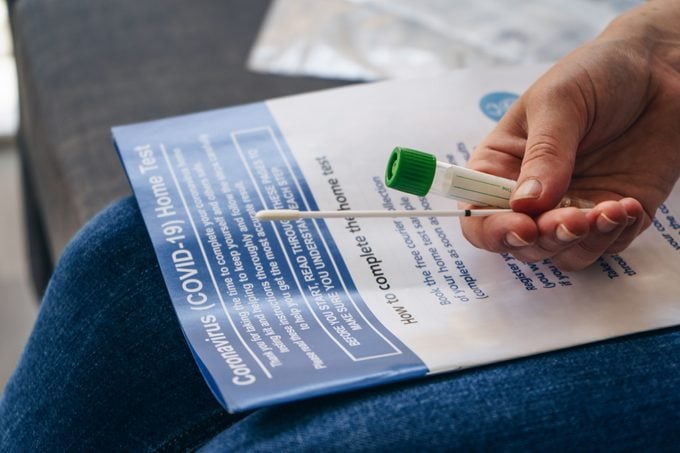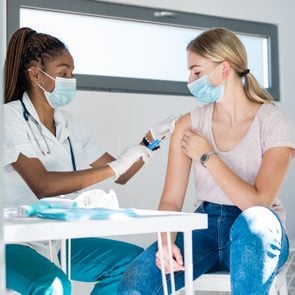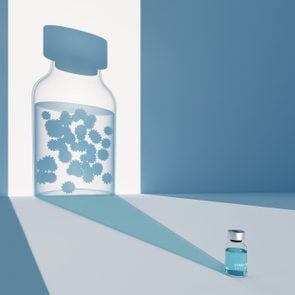How Long Can You Test Positive for Covid-19 After Infection?
Updated: Mar. 30, 2022
Depending on the test, you can still test positive for Covid months after recovery. You could even get a positive result after vaccination.
Testing positive for Covid-19
A small proportion of people who have received a Covid-19 vaccine have tested positive for infection, even some who have are considered fully vaccinated. There are a number of reasons why you could test positive post-vaccination.
“Patients who may have a pre-vaccination infection, may be infected before full vaccination is complete or develop a breakthrough infection,” says Robert Glatter, MD, an emergency physician with Lenox Hill Hospital in New York City. How long you can test positive depends on the reason behind it. (Read these eight Covid-19 vaccine stories to know what it’s like to get the shot.)
Types of Covid-19 tests
The world of Covid-19 testing can be confusing because there are tests to see if you have the virus and tests to see if you had the virus.
There are two types of tests—called diagnostic tests—that look for signs of current Covid-19 infection, explains Dennis Cunningham, MD, assistant medical director of infection prevention at Henry Ford Health System in Detroit.
Molecular and antigen tests can tell if you have an active infection and are typically performed with a nose swab.
Molecular tests are the most sensitive. They sometimes use polymerase chain reaction (PCR) technology to spot actual genetic material from SARS-CoV-2, the virus that causes Covid-19. So they are also called PCR or RNA tests. Molecular tests are the most accurate of the two diagnostic tests but may take days for the results to come back.
Antigen tests are also known as rapid tests. Antigens are molecules your immune system makes whenever there’s an infection. These tests return results in as little as 15 minutes. They may not detect early Covid infections and can give false positives.
Vaccinated people have tested positive on both types of diagnostic tests, though not often.
A third type of test, antibody testing, can tell you if you’ve been infected with Covid-19 in the past. Also called a serology test, this blood test may give results that day or within a few days. You’ll have a positive antibody test after you’ve been vaccinated or after you’ve had Covid.
The life cycle of Covid-19 illness
“The incubation period of Covid-19 can last as long as 14 days, and even up to 21 days,” says Dr. Glatter. That means you may not have symptoms for two or three weeks after being exposed. But you can be contagious even without symptoms.
“Even people who are infected don’t spread uniformly every day they’re sick,” says Scott Weisenberg, MD, an infectious disease physician and director of the travel medicine program at NYU Langone Health in New York City.
The Centers for Disease Control and Prevention (CDC) estimates that most patients are contagious for 10 to 15 days after symptoms began. This may extend to 20 days for some people with severe illness.
 How long can you test positive?
How long can you test positive?
Even without being vaccinated, this is really a moving target, says Dr. Glatter. “The exact duration of test positivity depends upon when you were exposed, your viral load, and the sensitivity of the Covid-19 test itself,” he explains.
Viral load is the amount of virus you have in your body. It can take nearly a week after being exposed to Covid-19 to gather enough viral load to test positive. The best time to get a test is five to seven days after being exposed to the virus. That should give you a pretty accurate read of whether you are positive or not.
According to the CDC, you can test positive up to three months after exposure even though you probably won’t be contagious for that long. But these parameters may vary among vaccinated individuals.
Pre-vaccination infections
All the Covid-19 vaccines are very effective but they only prevent infections going forward, not infections you picked up before getting your shot. People can test positive well before symptoms appear and, remember, as many as half the people who are infected never show symptoms.
“You can still stay positive for some time,” says Katherine L. Baumgarten, MD, medical director, infection control and prevention, Ochsner Health. That means you could be asymptomatic at the time of the vaccine even though you’ve been exposed which means you can still test positive for as long as three months.
That doesn’t mean, of course, that you’ll have coronavirus symptoms that long or be contagious. If you’ve been vaccinated and have symptoms or think you’ve been exposed, it’s still important to talk to a doctor, Dr. Baumgarten adds.
Post-vaccine window of vulnerability
It takes time for your body to build full immunity after vaccination. The Pfizer and Moderna vaccines each require two doses, three weeks and four weeks apart, respectively. “In the studies, it’s around day 12 when you start seeing a big separation between people who get vaccinated and those who don’t,” says Dr. Weisenberg.
You’re not considered fully vaccinated until two weeks after the second dose. That means you can theoretically still get infected for about two weeks after being fully vaccinated. A positive test can repeat for several weeks.
Breakthrough infections
Two of the vaccines which are approved in the United States—one from Pfizer-BioNTech and the other from Moderna—are 95 percent effective against symptomatic Covid-19 infections. The Johnson & Johnson vaccine, which is currently paused in the United States, is 74 percent effective overall. “The vaccines are good but they are not 100 percent effective,” says Dr. Baumgarten. That means “breakthrough infections” can happen.
(This is what to know about the Johnson & Johnson vaccine and rare blood clots.)
Theoretically, breakthrough infections could happen any time after you’re fully vaccinated which could mean a positive test. And, remember, the vaccines don’t last forever. Moderna has reported that its vaccine is still effective six months after administration, as has Pfizer. Many experts believe that booster shots will be needed to maintain the effectiveness.
It’s still a good idea to get vaccinated
In rare cases, you can still test positive after getting vaccinated but that doesn’t mean you shouldn’t get a shot. “On an individual basis, they’re outstanding vaccines and even people who still get sick may appear less likely critically ill or dying,” says Dr. Weisenberg.
The CDC reported that there were 5,814 breakthrough infections out of 75 million people vaccinated as of April 13. That’s a fraction of a percent. Your chances of developing complications or even dying from Covid-19 are much higher.
Next, learn about getting the vaccine after Covid infection.



